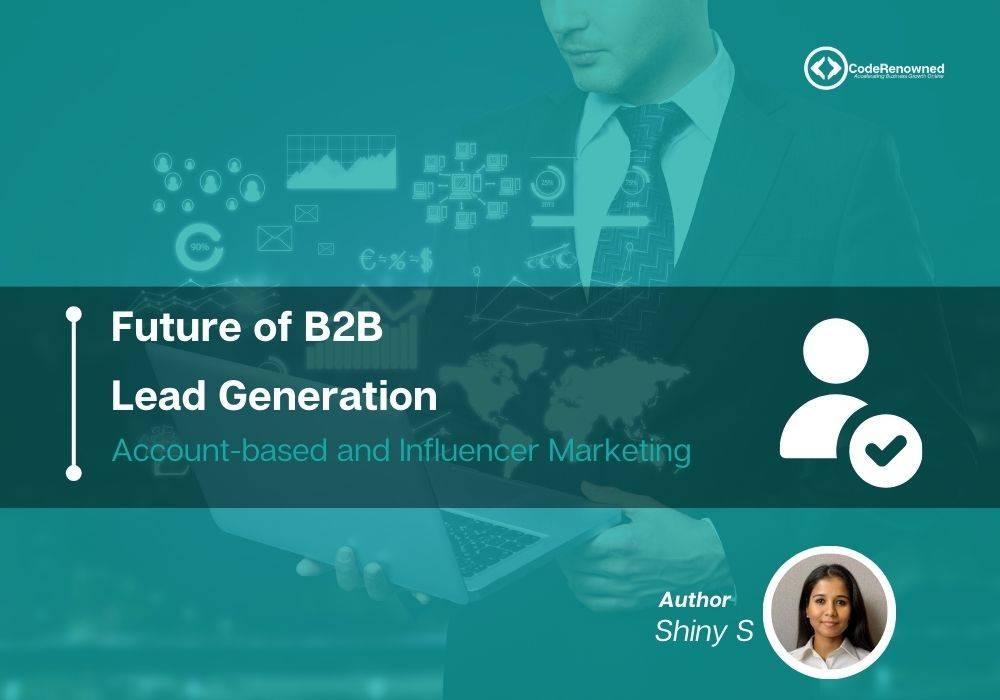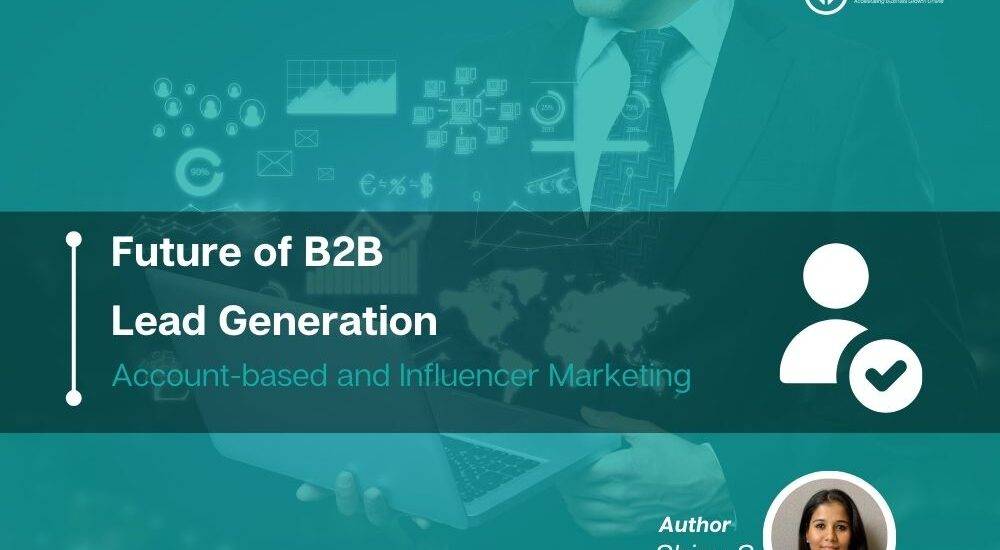The Future of B2B Lead Generation
Trends like account-based marketing and influencer marketing

In the landscape of B2B marketing, which is inconstancy, staying ahead is crucial for success. When businesses adapt to changing consumer behaviours and technological advancement, lead-generation strategies also must progress. Two prominent trends creating the future of B2B lead generation are Account-Based Marketing (ABM) and Influencer Marketing. Below the article, Let’s explore these trends and their implications for the future of B2B lead generation.
Artificial Intelligence (AI) and Machine Learning (ML): Artificial Intelligence and Machine Learning technologies are becoming increasingly advanced in automating various aspects of the lead generation process. Predictive analytics powered by AI can help businesses identify potential leads more accurately and efficiently.
Data Analyzation and Personalization: Data analytics Advancing will enable businesses to gain deeper insights into customer behaviour, preferences, and needs. This information can create highly targeted and personalized lead-generation strategies, improving the chances of conversion.
Chatbots and Conversational Marketing: AI-powered Chatbots are highly for initial customer interactions and lead qualification. Conversational marketing platforms enable real-time engagement with chances, providing instant information and assistance, and can significantly enhance lead generation efforts.
Social Selling: Social media platforms remain to be crucial for B2B lead generation. Sales teams use platforms like LinkedIn to identify and connect with potential leads. Social selling tools and strategies will likely evolve to become more integrated and effective.
Video Marketing: Video content is becoming more prevalent in B2B marketing. Platforms like webinars, product demos, and video presentations to engage with potential leads. Video content can convey complex information in a more digestible and engaging manner.
Blockchain for Trust and Transparency: Blockchain technology can enhance trust and transparency in B2B transactions. It verifies the authenticity of leads and transactions, reducing the risk of fraud and providing a more secure environment for business interactions.
Virtual and Augmented Reality (VR/AR): VR and AR technologies revolutionize product demonstrations and presentations in B2B industries. Virtual showrooms and immersive experiences can enhance lead generation, especially in industries where physical product showcasing is challenging.
Privacy and Compliance: With high concerns about data privacy, compliance with regulations such as GDPR (General Data Protection Regulation) and others will be crucial. Businesses prioritize ethical and transparent data practices to build and maintain trust with potential leads.
Integration of Marketing and Sales Technologies: The Marketing seamless automation tools with customer relationship management (CRM) systems will continue to be a priority. This integration ensures a united and streamlined lead generation process, from identification to conversion.
What is Account-Based Marketing (ABM)? Future of B2B lead Generation by ABM:
Account-based marketing is an approach where marketing efforts focus on specific target high-value accounts rather than individual leads. This strategy in B2B lead generation is gaining popularity as it allows for a more personalized and targeted approach, resulting in higher-quality leads.
The Several reasons for B2B lead generation shaped by ABM below are:
Hyper-personalization: ABM highlights hyper-personalization, tailoring marketing messages and content, particularly for target accounts beyond traditional segmentation, ensuring efforts resonate with unique needs and specific challenges. By providing a more personalized experience, businesses can foster stronger relationships with their target audience.
Sales and marketing Collaboration: Account-Based Marketing promotes collaboration between sales and marketing teams. With a shared focus on specific target accounts, these teams create and deliver highly targeted campaigns. This alignment ensures that both teams are on the same page, leading to more effective lead generation and conversion strategies.
Enhanced Return On Investment: Account Based Marketing helps businesses achieve a higher return on investment (ROI) by targeting high-value accounts compared to traditional lead generation methods. More focused approach resources are efficient, leading to better customer investment and revenue generation.
Technology integration: Advancements in technology play a crucial role in the success of Account Based Marketing. Artificial intelligence (AI) and Machine learning (ML) enable businesses to analyze data, identify accounts, and personalize marketing messages at scale. Incorporating technology into ABM allows for more efficient and effective lead-generation processes.
What is Influencer Marketing? Transformation of B2B lead generation By IM :
Influencer Marketing, once associated with B2C(Business to Customer) marketing, is gaining traction in B2B(Business to Business). B2B decision-makers rely on industry experts and thought leaders for insights and recommendations. Imposing influencers in B2B lead generation strategies offers unique advantages that are reforming the future of business-to-business marketing.
Building trust and credibility: In Business to Business, trust is a critical factor. Influencers often recognize industry experts to bring trust and credibility to the table. When influencers endorse a product or service, it adds originality to the brand, influencing the purchase decisions of potential clients.
Access to niche audiences: In Business to Business, reaching a highly target audience is essential. Influencers with dedicated and niche followers provide access to a specific and engaged audience. This targeted approach ensures marketing messages are delivered to the right people, increasing the likelihood of lead generation success.
Thought leadership and expertise: Influencers in Business to Business are thought leaders and experts in their fields. Collaborating with influencers allows businesses to be experts, benefiting from valuable insights and industry knowledge that helps position the business as an authority in the eyes of potential customers.
Amplifying content reach: Influencers have a notable following on various digital platforms. Leveraging their reach allows businesses to boost their content and marketing messages. This extended reach can increase brand visibility, lead generation, and business growth.
Integration of ABM and Influencer Marketing:
The future of B2B lead generation is not limited to adopting ABM or Influencer Marketing. An approach to these two trends can be a powerful strategy for businesses to enhance their lead-generation efforts.
Influencer-assisted ABM campaigns: Incorporating influencers into ABM campaigns can intensify their impact. Influencers can contribute by creating content, participating in webinars, or endorsing specific products or services targeted at high-value accounts, adding credibility to ABM’s efforts.
Leveraging influencer networks: Influencers have extensive networks within their industries. Businesses can hold these networks to identify and reach potential high-value accounts. This effort ensures marketing messages extend to decision-makers through trusted channels, increasing the likelihood of successful lead generation.
Joint thought leadership initiatives: Collaboration thought leadership initiatives involving the business and influencers elevate the brand’s position in the market. Joint webinars, panel discussions, or content co-creation expertise and authority, attracting attention from key accounts and generating valuable leads.
Conclusion
The Business-to-business lead generation is in constant flux, and businesses must evolve to stay competitive. Account-Based Marketers and Influencer Marketers are at the forefront of this evolution, reshaping how B2B brands approach lead generation. By hyper-personalization, collaboration between sales and marketing, and leveraging the expertise and reach of influencers, businesses can position themselves for success in B2B marketing. Integrating these trends offers a comprehensive and Successful approach to lead generation, ensuring that Marketing remains agile and responsive to the evolution of the market.







